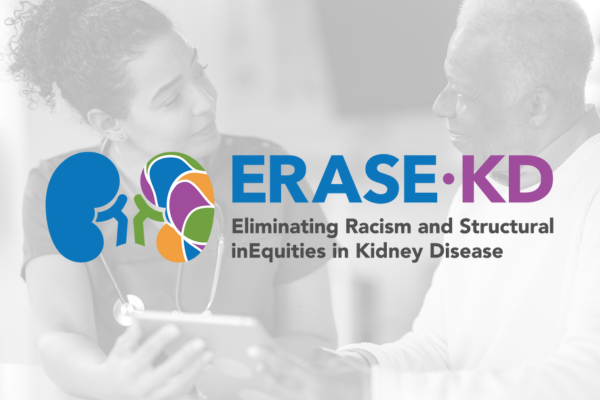
Some 37 million people in the U.S. – more than one in seven adults – have chronic kidney disease (CKD). But not everyone faces the same risk.
- Black people are four times more likely than non-Hispanic white people to develop kidney failure;
- Hispanic people and Native American people are more than twice as likely than non-Hispanic white people to develop kidney failure; and
- Asian people are four times more likely than non-Hispanic white people to develop kidney failure.
A new research consortium led by the Duke Clinical Research Institute and the Samuel DuBois Cook Center on Social Equity focuses on addressing the striking disparities in kidney health linked to structural racism.
The Eliminating Racism And Structural inEquities in Kidney Disease (ERASE-KD) consortium will implement interventions that address structural racism linked to kidney health disparities that disproportionately affect racial and ethnic minority groups in the U.S.
The consortium website recently launched and includes information on individual research projects, leadership, and resources.
Funded through the National Institute of Diabetes and Digestive and Kidney Diseases, ERASE-KD is led by the research coordinating center based at the DCRI, an executive committee, a steering committee, and a community partner network. Duke University’s Keisha Bentley-Edwards, PhD, MA, Christina Wyatt, MD, MSc, and Huiman Barnhart, PhD, MA, are ERASE-KD co-principal investigators, and Stefany Olague, MPH, is the project director.
“The health impact of racial disparities in kidney disease is alarming,” Wyatt said. “We know that people are disproportionately affected by CKD and kidney failure based on their race, and the ERASE-KD consortium members will work together to create, implement, and assess meaningful strategies aimed at breaking down or lessening the effects of structural racism.”
Structural racism refers to governmental and societal practices — such as housing segregation and institutional policies — that limit the opportunities, resources, and well-being of individuals based on race. Structural racism has been shown to be a root cause of the glaring gaps in health outcomes for individuals with CKD and kidney failure in the U.S.
“We are working together to address unjust social risks, systems, and policies that create health inequities in racial and ethnic minority populations,” Bentley-Edwards said. “Community leadership and insights will be essential to develop and then evaluate these powerful solutions to address structural racism head on.”
Together, the coordinating center will work with five project teams in the U.S., focusing on solutions developed with input from the communities most affected by kidney disease. Project teams, including academic researchers and community leaders, will ensure that local communities are involved at every step of the process.
The interventions investigated in ERASE-KD to address health disparities are usually implemented by facilitators, such as community health workers, while the standard practice is used as the control. This setting is ideal for an individually randomized group-treatment (IRGT) trial where participants randomized to the intervention group share common facilitators while participants randomized to the control group do not have facilitators.
Barnhart highlighted the consortium’s emphasis on the right methodological approach to this research.
“In trial design and analysis, it is important to account for the different implementation features of the intervention that address these health disparities,” she said. “It’s exciting to see that the ERASE-KD trials are taking advantage of the innovative IRGT design to account for different facilitators that cannot be considered interchangeable.”